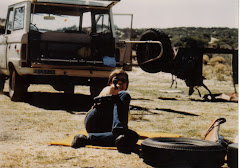
Early last week, I got into a little fender-bender on the way home from work. Not much damage, but a little. You should see the other car. That silly plastic bumper broke clean off into several pieces. So, I'm taking the car to the body shop tomorrow to have the deep scratch fixed up and repainted.
I went to the shop Friday to set myself up with an appointment, and scope out the joint. Not having had a traffic dust-up since the mid-1960's, I don't know any body men. My insurance company recommended a shop in North Hollywood, so that's where I went.
Turns out I like the owner. He talks straight and is in his late fifties, so he's been around the block a couple of times. He has an East European accent, and fairly reeks of old world craftsmanship.
This leads me to ask myself why I find these things so comforting.
I've spent a lot of time fooling around with cars and motorcycles, including some years working in and managing gas stations. Years ago, I knew a young line mechanic who claimed he didn't care if he got the job done correctly, as long as he could get it done fast. If he could beat the Flat Rate Book's time, he'd get paid as a percentage of the flat rate, rather than his hourly salary.
Follow me on this, for those of you who aren't familiar. The mechanic's Flat Rate book shows how many hours it should take to do a particular repair. Let's say a brake job, four wheels, no complications, should take 2 hours, according to the book. Let's say my mechanic friend blows through the job in one hour. Instead of getting $30 for two hours' work, he gets the same $30 for an hour's work. He can go on and do another brake job in the next hour and get another $30. Not all auto shops work this way, but some do.
My friend, in order to work this quickly, had to blow through the job, eschewing several checks and cautions in his work. Anything to get the car out of his bay fast, and without any immediately noticeable problems. If something goes wrong day after tomorrow, bring it back; he'll fix it for free.
Often, the work goes well, with no problems. Occasionally, a customer has a problem and returns the car. My friend would then fix it more carefully, at no additional charge. Rarely, the customer has an accident caused by an incomplete repair, but responsibility doesn't come back to the mechanic. Often, to avoid the hassle of losing his car for another day, the customer just drives it as it is, problem and all. The Mechanic wins in almost every case.
Knowing this, I try to do as much of my mechanical work as I can, myself. Otherwise, I look for the old bear, the mechanic who's been at it for thirty, forty years and who takes pride in his ability and knowledge. He'd rather do the job right, than fast. When I find someone like that, he gets all my patronage.
The older guys seem to have grown up in a time when the work ethic was better--not all of them, to be sure, but many. The youngsters now in their twenties and thirties grew up in an atmosphere of quick self satisfaction and spur-of-the-moment pragmatism.
This body shop guy reads like a man who takes pride in a good job. I also met his son, who is a shop manager, and he actually seems the same way. Enthusiastic. Proud of his work.
I hope those work attitudes don't die out.
One's life is best summed up in the quality of his work.
Warm regards,
Col. Hogan
Stalag California






6 comments:
I certainly believe in doing something well the first time, if you can do it properly you might as well not do it.
Besides in my line of work if you don't do it properly and it breaks later on you'll have to do it properly anyway, so might as well do it right the first time.
Yep. I know what you mean. Unfortunately, it's getting harder and harder to find people who think that way.
I remember back "in the day", the last company I worked for and where I became a full time mech tried to put his mechs on flatrate. I had been a mech long enough to know I could kill him if he used the Mack book rate. He said that he was going to use Dudley's flat rates (his name is Dudley). Anyways that's why I'm working for Allied now.
They have put the drivers on "incentive" pay where I work. I've told them that when they do that the first thing to suffer is maintenance on the equipment, the second and most important thing to suffer is the safety aspect. Personally, I don't like the incentive, or commision aspect of our trade, but you are wrong to blame the techie, it's the owners that demand the work for the pay.
I try and remind all my techs that in an extreme situation that their butt can be on the line. If they take shortcuts or bypass steps in their repairs they can and will be charged. They will be on their own in the court because the company supplies the policies and procedures. We are a fleet shop hourly pay, though. I imagine the liability is just as great in a commision shop
I know the flat rate is designed to favor the shop owner--that's why they use it. This mechanic was also making it work for him, at least in the short term. He bragged about making big money by getting the cars out fast.
As a consumer, I'm opposed to this practice. Using the flat rate book as a guideline for an estimate is fine, but giving the mechanic an incentive to do shoddy work can't be good.
For a craftsman to work fast is fine, if he does so by means of knowledge and experience, and by employing methods of economy of motion. This is what I look for.
There's got to be nothing worse than being in a dead end job doing a crappy job. I don't know anything about mechanics but I know that I aim to be the best at my job that I can and it pays off with the trust from your employer and the respect of people around you. Why drag yourself off to do a half-baked job in a career you hate? Find something you enjoy doing and be the best at it.
My sentiments exactly, Aurora. Life's too short to spend a third of it doing something you don't like.
Post a Comment